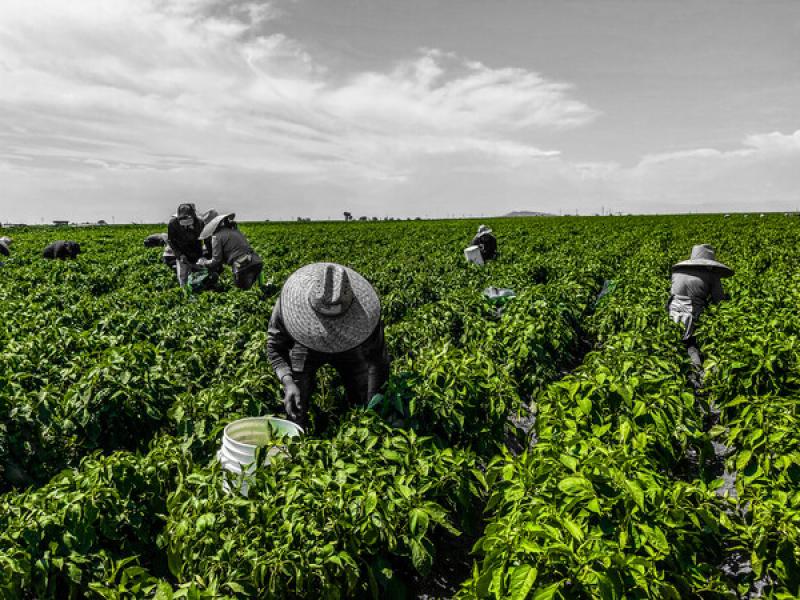Esencial: An Online Community Archive to Disseminate the Stories of Colorado Agricultural Workers
By: Alejandro Cerón, Associate Professor | DU Ethnography Lab, Department of Anthropology & Kassandra Neiss, Front Line Farming, and Project Protect Food Systems Workers

We built “Esencial”, a digital community archive that documents the fight for rights, respect, and visibility by agricultural workers in Colorado during a time plagued by racism, climate chaos, and public health crises. In resistance to the systems that invisibilize and oppress agricultural workers, these workers, their families and allies continue to build power and capacity to bring about a future of liberation. To that end, this public archive positions these realities as undeniable, celebrates these humans who are always essential, and invites the public to take further action towards justice. Our storytelling project focuses on agricultural workers and their families in Colorado. Agricultural workers have been undervalued and often exploited, and with cruel irony, as part of pandemic response were deemed “essential.” Now that our collective dependence on agricultural workers has been laid bare, it is time to offer them dignity, respect, and support in tangible forms.
Colorado agricultural workers number between 36,000 and 55,000, but are often left out of the public discourse, rendered invisible to the larger community. Those who grow our crops and raise our animals hold knowledge, stories and experiences that we all should elevate, learn, and hold dear. Advocates for agricultural workers have shown that these communities are affected by environmental and social stressors, and substandard living conditions. There is growing evidence that social stressors including poverty, racial discrimination, malnutrition, lack of health care, social marginalization, and legal status also affect these communities. While there are methodological challenges to addressing cumulative impacts in science and policy making, storytelling work provides representation and opportunities for self-advocacy for these workers who have long been exploited.
Multiple professional and academic disciplines have faced a crisis of representation that has been exacerbated during the past two years. While such crisis of representation, namely the uncertainty about the adequate means to describe social reality and problems, has been debated for decades in the humanities and humanistic social sciences, it is perceived as relatively new in professional and applied disciplines. As a result, the stories that emerge from their traditional disciplinary tools tend to stigmatize, invisibilize, or misrepresent the marginalized and minoritized social groups more deeply affected by social inequalities. In consequence, there is a need for developing counter-narratives that emerge from those social groups, which involves the cultivation of community-based, collaborative methodologies that facilitate counter-storytelling, and a bottom-up process of knowledge creation that offers viable alternatives to hegemonic discourses. This project brings together the techniques from collaborative ethnography, and decolonizing museum studies to develop methods that are applicable to advocacy and community outreach, offering an opportunity to expand and update the applied anthropology toolbox to meet the challenges of our times.
The project’s goal was to build a digital community archive to document the fight for rights, respect, and visibility by agricultural workers in Colorado. The project’s aims were
(1) to create a functional online community archive
(2) to have the majority of members of Project Protect Promotora Network (PPPN) submit stories to the archive
(3) to use the community archive for PPFSW’s advocacy work; and
(4) to analyze the stories submitted to the archive and build the narratives about agricultural workers in Colorado that emerge from them
The stories feeding the archive have come from PPPN outreach workers currently providing consistent services and support to agricultural workers and their families. PPPN operates across four regions in Colorado: Northeast, San Luis Valley, Southeast/Arkansas River Valley, and on the Western Slope. The outreach focuses on COVID relief, vaccination support, food distribution, and other basic needs navigation such as interpretation services at hospitals and assistance with DMV appointments. Team members are master networkers, developing their knowledge and connecting community members with local services such as housing supports. The activities were initially reported in a standardized format, but the team developed more skills for promotoras to submit stories that tell a wider audience about the reality agricultural workers face in Colorado. The project, funded through CCESL, supported the creation of the digital community archive, for which we had already designed the back-end, consisting on a cataloguing system and metadata. The funding supported the creation of the infrastructure that has made the archive usable for the promotoras of the PPPN. The Esencial archive (https://esencialcolorado.org/) currently has 150+ stories, offering a platform from which PPFSW has access for them to be used for local- and state-level advocacy efforts.
Project Impacts:
The project has received a grant from the Colorado Equity Compass Storytelling Award (2022). We have applied to a Redline grant (to be announced in April 2024). Cerón gave a presentation at the Denver Public Libraries Ross University Hills branch titled “Storytelling and the advancement of agricultural workers rights in Colorado” in April 2023. Neiss, Cerón, and two PPFSW’s promotoras, Brenda Tanori and Anita Rodriguez, facilitated a workshop titled “Essential Voices: Creating a Story Archive to Resist Invisibilization” at the Conference on Community Writing: Activating Radical Imagination, in Denver in October 2023. An MA in English thesis titled “Movement, silence, and voice in the testimonio archive: Esencial Colorado and Valeria Luiselli’s Lost children archive and Tell me how it ends: An essay in 40 questions” by Mitchell C. Christensen (CU Denver, 2023) discusses the Esencial archive as a type of creative work he finds close to the testimonio genre.
Image: "The land is a gift and creative hands are needed to produce it!" October 2022. Esencial Colorado, https://esencialcolorado.org/items/show/125